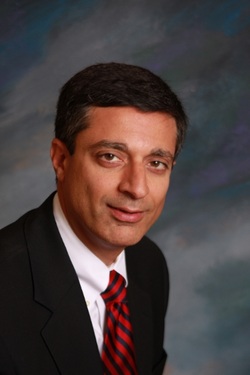I do think the major takeaway from Dr. Lonial's presentation was the excellent results he and his team at Emory in Atlanta have achieved with the high risk group of patients. At 3 years 93% of patients were alive vs. the numbers frequently quoted as 50% survival at 2 years. It was my previous thinking either Mayo Scottsdale or UAMS would be the center to unlock a major breakthrough for high risk multiple myeloma treatment. UAMS which has had such remarkable success in the treatment of low risk disease has not been able to repeat this for high risk myeloma and quotes their average life expectancy of 2 years for the high risk cohort of patients.

1) Of great importance is to conduct the cytogenetic testing like FISH tests to determine if the patient is high or low risk.
2) Hit myeloma as soon after diagnosis as possible with the best and most effective approved first line treatment, which Dr. Lonial believes is RVD. (Revlimid, Velcade, and Dexamethasone)
3) If transplant eligible conduct an early Auto Stem Cell Transplant, but only one transplant. Emory feels one of the characteristics of high risk disease is the DNA is highly unstable and exposing the myeloma to high dose chemotherapy, like Cytoxan and Melphalan, will increase the damage to the already unstable DNA.. This will create more aggressive and harder to treat clones.
4) Transplant is always followed by RVD consolidation, and 3 years of maintenance. This is where the risk assessment comes into play. If high risk or intermediate risk the maintenance is RVD, (Revlimid, Velcade, and Dexamethasone). If low risk it would be just Revlimid. It is three years of maintenance because his earlier work showed that relapse often followed the early discontinuation of maintenance.
The average life expectancy has yet to be reached, but my educated guess is that it will approach 5 years or more. This will be more than twice that which other centers reported. In addition, it is a formula which should be able to be followed by any of the world's multiple myeloma specialists.
Good luck and may God Bless your Cancer Journey. For more information on multiple myeloma survival rates and treatments CLICK HERE and you can follow me on twitter at: https://twitter.com/grpetersen1
There is so much more in Dr. Lonial's broadcast and I highly recommend you listen to it in its entirety. A short bio of Dr. Lonial follows:
Sagar Lonial MD
Dr. Lonial is internationally recognized as a leading authority in multiple myeloma treatment and research.
Professor and Vice Chair of Clinical Affairs, Department of Hematology and Medical Oncology - Emory University School of Medicine
Vice Chair of the Eastern Cooperative Oncology Group - Myeloma Committee
Chair of the Steering Committee - Multiple Myeloma Research Consortium
As a medical oncologist at the Winship Cancer Institute, Dr. Lonial treats patients with multiple myeloma and is a lead member of the bone marrow transplantation team and clinical trials team. He is involved in numerous professional organizations including the American Society of Clinical Oncology, American Society of Hematology, and the American Society for Blood and Marrow Transplantation. Additionally, Dr. Lonial is on the board of directors for the International Myeloma Society, and on the scientific Advisory Board for the International Myeloma Foundation.
He received his medical degree from the University of Louisville School Of Medicine. He completed his internship and residency at Baylor College of Medicine in Houston, Texas, followed by a fellowship in hematology and oncology at Emory University School of Medicine in Atlanta, Georgia.
 RSS Feed
RSS Feed